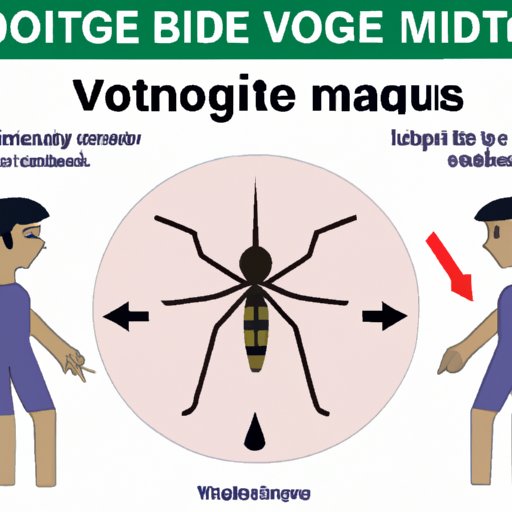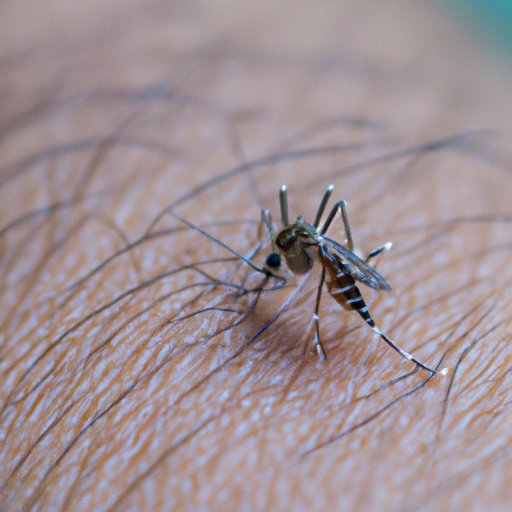I. Introduction
It’s the height of summer, and everyone is excited to enjoy picnics, the beach, and the great outdoors. Except for one small buzzkill – the mosquito. Often found in warm, humid areas, mosquitoes are a ubiquitous pest that can ruin a perfect day with their itchy bites. But why do they create such an irritating reaction in our bodies, and how can we minimize their impact on our fun?
This article aims to explore the science behind mosquito bites, the impact that mosquitoes have on our health and the ecosystem, and the most effective ways to control their populations and bites.
II. Exploring the Science Behind Mosquito Bites
Before delving into why mosquito bites are itchy, it’s essential to understand the unique feeding habits of mosquitoes, which have evolved over millions of years. The female mosquito requires a blood meal to lay eggs, and she uses her highly specialized proboscis to penetrate the skin and reach a blood vessel.
Once she has found a suitable site to feed on, she injects saliva into the skin, which contains compounds that prevent blood clotting and facilitate blood flow. It’s this saliva that triggers the immune response and causes the itching and swelling associated with mosquito bites.
III. The Battle Between Mosquitoes and Humans
Mosquitoes have been a thorn in humanity’s side for thousands of years, with literature mentioning them as early as the Roman Empire. Despite significant advancements in technology and medical science, mosquitoes remain a formidable rival, given their ability to reproduce quickly and adapt to changing environments.
Their behavior is influenced by unique factors, including body heat, carbon dioxide, and chemical signatures, which help them track down specific individuals. Some people seem to be more attractive to mosquitoes than others, with studies suggesting that these individuals may produce more carbon dioxide and lactic acids.
While mosquito bites can be an irritation, they can also have serious health implications. Mosquitoes are carriers of various diseases, including dengue fever, malaria, and the Zika virus. In some regions, mosquitoes present a considerable health risk, contributing to millions of deaths each year.
IV. Top Tips for Avoiding Mosquito Bites
It’s not always easy to avoid mosquitoes, but there are several practical steps you can take to minimize your exposure to them. One option is to use natural mosquito repellents such as lavender, citronella, and peppermint oil, which have been proven to have some success. Other tips may include wearing long sleeves and pants, using mosquito nets, and avoiding outdoor activities during peak mosquito hours.
Another key factor in reducing mosquito populations is to minimize their breeding ability. You can do this by eliminating standing water, cutting long grass, and keeping gardens and yards clean and tidy. Mosquito traps are another option, but it’s important to ensure their safe use and disposal.

V. Understanding and Treating Mosquito Bite Symptoms
If you do get bitten, several treatment options can help alleviate the itching and swelling. Applying a cold compress to the bite area can provide a quick fix, as can using antihistamines or topical creams. Calamine lotion or hydrocortisone cream can also be effective at reducing itching and inflammation.
VI. The Impact of Mosquito Bites in Different Parts of the World
The threat posed by mosquitoes varies significantly depending on where you are in the world. In tropical regions, mosquito-borne illness contributes to a considerable burden of disease, with limited access to medical resources to combat their spread. In contrast, mosquitoes in developed countries are less of an issue, although they can still be a nuisance, particularly in areas with standing water and high humidity.
Various initiatives have been launched to address the impact of mosquito-borne illnesses. These range from mosquito eradication programs to vaccine research and public awareness campaigns.
VII. Why Are Some People More Prone to Mosquito Bites Than Others?
Studies have shown that mosquitoes are more attracted to some individuals than others. Factors such as body heat, certain odors, and blood type may contribute to this increased attractiveness. Additionally, mosquitoes prefer certain clothing colors and detect movement and sound vibrations.
While it may be difficult to change your body’s natural chemistry, certain measures can be taken to reduce attractiveness to mosquitoes, such as avoiding fragrances, covering exposed skin, and using mosquito repellents.
VIII. The Benefits and Drawbacks of Mosquito Control Methods
There are several methods available to control mosquito populations, ranging from chemical sprays to biological control options. However, many of these methods have drawbacks, including potential health risks, impact on the ecosystem, and resistance to treatment. Chemical sprays can harm beneficial insects and contaminate water sources, while biological control options may have unintended consequences and cause ecological imbalances.
A more promising option may be the use of gene editing techniques to create self-limiting mosquitoes. These genetic modifications could reduce populations and the spread of diseases without compromising ecosystem health. However, much research is still needed to determine the safety and effectiveness of these options.
IX. Conclusion
Mosquito bites can be a significant annoyance, but they can also pose a genuine threat to human health. Understanding their behaviors, minimizing breeding sites, and using effective personal protection measures can all help reduce their impact. While there is still much to learn about the most effective ways to control mosquito populations, research is continually evolving, and new developments may provide innovative options in the future.
By following the strategies outlined in this article, you can reduce your chances of being bitten and minimize the impact of mosquito infestations in your local area, making your summer fun, enjoyable, and bite-free.
